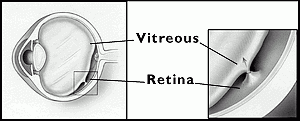What are floaters?
You may sometimes see small specks or clouds moving in your field of vision. They are called floaters. You can often see them when looking at a plain background, like a blank wall or blue sky. Floaters are actually tiny clumps of gel or cells inside the vitreous, the clear jelly-like fluid that fills the inside of your eye.
While these objects look like they are in front of your eye, they are actually floating inside. What you see are the shadows they cast on the retina, the nerve layer at the back of the eye that senses light and allows you to see. Floaters can have different shapes: little dots, circles, lines, clouds or cobwebs.
What causes floaters?
When people reach middle age, the vitreous gel may start to thicken or shrink, forming clumps or strands inside the eye. The vitreous gel pulls away from the back wall of the eye, causing a posterior vitreous detachment. It is a common cause of floaters. Posterior vitreous detachment is more common for people who:
The appearance of floaters may be alarming, especially if they develop suddenly. You should see an ophthalmologist (a medical eye physician) right away if you suddenly develop new floaters, especially if you are over 45 years of age.
Are floaters ever serious?
The retina can tear if the shrinking vitreous gel pulls away from the wall of the eye. This sometimes causes a small amount of bleeding in the eye that may appear as new floaters. A torn retina is always a serious problem, since it can lead to a retinal detachment. You should see your ophthalmologist as soon as possible if:
If you notice other symptoms, like the loss of side vision, you should return to your ophthalmologist.
What can be done about floaters?
Floaters can get in the way of clear vision, which may be quite annoying, especially if you are trying to read. You can try moving your eyes, looking up and then down to move the floaters out of the way. While some floaters may remain in your vision, many of them will fade over time and become less bothersome. Even if you have had some floaters for years, you should have an eye examination immediately if you notice new ones.
What causes flashing lights?
 You may have experienced this same sensation if you have ever been hit in the eye and seen “stars.” When the vitreous shrinks, it tugs on the retina, creating a sensation of flashing lights.The flashes of light can appear off and on for several weeks or months. As we grow older, it is more common to experience flashes. If you notice the sudden appearance of light flashes, you should visit your ophthalmologist immediately to see if the retina has been torn.
You may have experienced this same sensation if you have ever been hit in the eye and seen “stars.” When the vitreous shrinks, it tugs on the retina, creating a sensation of flashing lights.The flashes of light can appear off and on for several weeks or months. As we grow older, it is more common to experience flashes. If you notice the sudden appearance of light flashes, you should visit your ophthalmologist immediately to see if the retina has been torn.
Migraine
Some people experience flashes of light that appear as jagged lines or “heat waves” in both eyes, often lasting 10-20 minutes. These types of flashes are usually caused by a spasm of blood vessels in the brain, which is called migraine. If a headache follows the flashes, it is called a migraine headache. However, jagged lines or “heat waves” can occur without a headache. In this case, the light flashes are called ophthalmic migraine, or migraine without headache.
How are your eyes examined?
When an ophthalmologist examines your eyes, your pupils will be dilated with eye drops. During this painless examination, your ophthalmologist will carefully observe your retina and vitreous. Because your eyes have been dilated, you may need to make arrangements for someone to drive you home afterwards. Floaters and flashes of light become more common as we grow older. While not all floaters and flashes are serious, you should always have a medical eye examination by an ophthalmologist to make sure there has been no damage to your retina.